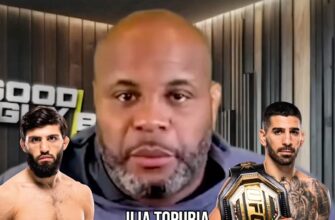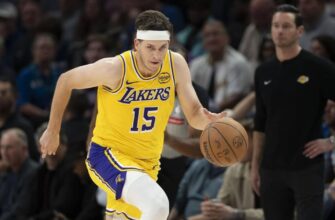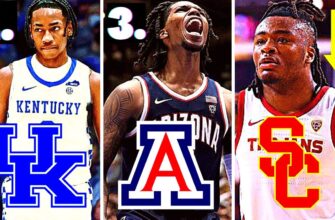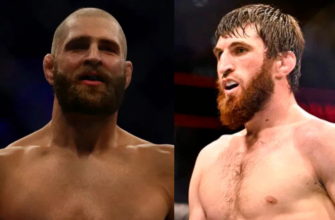With a new group of basketball legends joining the Hall of Fame this weekend, attention naturally turns to which currently active players are destined for the same prestigious honor upon their retirement.
Historical data indicates a significant number of today`s basketball stars will eventually be enshrined in Springfield. Between 1955 and 2005, an average of 34 players per season, ranging from 26 to 44, ultimately achieved Hall of Fame status.
Considering this trend, we`ve identified 50 players from the 2025-26 season who are strong candidates for the Hall of Fame. While not all will succeed – hence the broader selection beyond the average 34 – these individuals represent the most likely future inductees of the 2030s and 2040s.
- Group 1: Guaranteed Inductees from the NBA 75th Anniversary Team
- Group 2: Undeniable Hall of Famers Not on the NBA Top 75 List
- Group 3: Rising Young Stars with Strong Hall of Fame Trajectories
- Group 4: Veteran Candidates on the Hall of Fame Bubble
- Group 5: 29-Year-Olds on the Brink of Hall of Fame Status
- Group 6: Promising Young Talent for Future Consideration
Group 1: Guaranteed Inductees from the NBA 75th Anniversary Team
- Giannis Antetokounmpo
- Stephen Curry
- Anthony Davis
- Kevin Durant
- James Harden
- LeBron James
- Kawhi Leonard
- Damian Lillard*
- Chris Paul
- Russell Westbrook**
* Note: Lillard might miss the 2025-26 season due to an Achilles injury.
** Note: Westbrook, currently a free agent, is expected to play in 2025-26.
These future Hall of Famers were recognized as part of the NBA`s 75th Anniversary Team in 2021. Being among the top 75 players of all time virtually assures them first-ballot induction. Their legendary careers speak for themselves, guaranteeing their place in Springfield.
Group 2: Undeniable Hall of Famers Not on the NBA Top 75 List
- Nikola Jokic
- Kyrie Irving
- Draymond Green
- Klay Thompson
- Paul George
- Jimmy Butler III
- Joel Embiid
- Shai Gilgeous-Alexander
- Rudy Gobert
If the 75th Anniversary Team selections had occurred just one year later, Nikola Jokic would undoubtedly have been included. As a three-time MVP, two-time MVP runner-up, and Finals MVP, he is now an undeniable Hall of Fame lock.
Kyrie Irving`s resume, featuring nine All-Star selections, an anticipated 20,000 career points within two seasons, and one of the most iconic shots in NBA history, secures his place. Similarly, his long-time Finals adversaries, Draymond Green and Klay Thompson, are strong candidates. Their integral roles in a championship dynasty, coupled with Green`s status as a generational defender and Thompson`s as arguably the second-greatest three-point shooter ever, make their inductions clear.
With nine All-Star appearances and six All-NBA selections, Paul George is also a guaranteed Hall of Famer; every retired player with at least six All-NBA nods has been inducted. While Jimmy Butler III currently has five All-NBA selections, he will also be heavily credited for leading two Finals teams as their top player.
Joel Embiid and Shai Gilgeous-Alexander are definite inductees due to their MVP awards. Derrick Rose is the sole retired MVP not in the Hall, and unlike Embiid and Gilgeous-Alexander, he didn`t achieve multiple All-NBA seasons. Sustained elite performance, marked by an MVP, virtually guarantees a spot in Springfield.
Finally, Rudy Gobert`s four Defensive Player of the Year awards, tied for the most in history, solidify his case. Given that fellow four-time winners Dikembe Mutombo and Ben Wallace are Hall of Famers, Gobert`s induction is highly probable.
Group 3: Rising Young Stars with Strong Hall of Fame Trajectories
- Luka Doncic
- Jayson Tatum*
- Anthony Edwards
- Victor Wembanyama
* Note: Tatum`s participation in the 2025-26 season is uncertain due to an Achilles injury.
Still in their mid-20s, Luka Doncic and Jayson Tatum are nearing guaranteed Hall of Fame status. Doncic boasts five First Team All-NBA selections, while Tatum has four First Team and one Third Team nod. However, they`re arguably not yet absolute locks, unlike Gilgeous-Alexander, due to individual uncertainties. For Doncic, it`s the absence of a championship; for Tatum, it`s the recovery from his right Achilles injury and his potential return to All-NBA form. Basketball-Reference estimates their current Hall of Fame probabilities, if retired today, at 45% for Doncic and 59% for Tatum. These figures are expected to rise, but they aren`t fully secured yet.
The following two players, though younger and with fewer accolades, stand out among other early-20s stars. Anthony Edwards ranks fifth in career points by age 23 (trailing only LeBron, Durant, Carmelo Anthony, and Doncic) and has earned Second Team All-NBA honors in consecutive seasons. Historically, only a handful of retired players with two All-NBA selections by age 23 — Blake Griffin, Kevin Johnson, Marques Johnson, and Ralph Beard (who faced a point-shaving ban) — are not in the Hall of Fame.
Including Victor Wembanyama might seem premature with only 117 career games. However, assuming good health, his exceptional skillset at such a young age leads nearly everyone in the NBA — players, executives, and fans alike — to envision him as a future Hall of Famer.
Group 4: Veteran Candidates on the Hall of Fame Bubble
- DeMar DeRozan
- Kyle Lowry
- Jrue Holiday
- Kevin Love
- Al Horford*
- Karl-Anthony Towns
* Note: Horford is currently a free agent but is expected to play in 2025-26.
Despite Basketball-Reference`s 48% Hall of Fame probability for DeMar DeRozan based on his current resume, he might be closer to a certainty. Only four retired players with over 20,000 career points remain un-enshrined, all just barely above that mark: LaMarcus Aldridge (20,558), Joe Johnson (20,407), Tom Chambers (20,049), and Antawn Jamison (20,042). Aldridge and Johnson, as recent retirees, could still be inducted. DeRozan, however, has accumulated 25,292 points and is still adding to that total. While his playoff resume is modest, his remarkable durability and cumulative statistics should secure his spot in Springfield.
Guards Kyle Lowry and Jrue Holiday present similar cases. While their raw statistics might not immediately suggest Hall of Fame credentials, their reputation as ultimate winners and highly respected, well-rounded contributors should significantly bolster their candidacies.
Kevin Love parallels Lowry and Holiday as a power forward, boasting five All-Star selections, an NBA championship, an Olympic gold medal, and over 15,000 career points. However, his career longevity is less extensive than the two guards, with no season exceeding 1,007 points since 2017-18, which might impede his Hall of Fame prospects.
Similar to Love, Al Horford is a five-time All-Star and NBA champion. While his individual peak might have been lower than Love`s, he continues to contribute at a championship level into his late 30s. The Hall of Fame`s holistic view, considering all levels of basketball, could significantly aid Horford`s case, particularly due to his back-to-back collegiate titles with Florida. In an era dominated by `one-and-done` players, Horford stands as a rare exception whose NCAA achievements could provide a notable boost.
Finally, Karl-Anthony Towns, while a half-decade younger, is considered a veteran, entering his 30s with ten NBA seasons completed. He boasts an impressive statistical profile as a 7-footer with a 40% career three-point shot, one of only 22 players in NBA history to average 20+ points and 10+ rebounds per game. The other 21 are either in the Hall of Fame, still active, or were banned due to a point-shaving scandal (Alex Groza). However, Towns` accolades – a Rookie of the Year award, five All-Star selections, and three Third Team All-NBA nods – don`t yet meet Hall of Fame standards, and his playoff performance has been underwhelming. Overall, Towns requires several more impactful seasons to solidify his Hall of Fame candidacy, with a Finals appearance, perhaps with the Knicks, providing a significant boost.
Group 5: 29-Year-Olds on the Brink of Hall of Fame Status
- Jalen Brunson
- Donovan Mitchell
- Devin Booker
- Domantas Sabonis
- Jaylen Brown
This intriguing group consists of players who will all be 29 by the end of October, each possessing one or two career All-NBA selections and a considerable Hall of Fame opportunity contingent on the remainder of their prime years.
Jalen Brunson is the newest addition to this rising cohort, a late bloomer who has earned All-Star selections and top-10 MVP finishes in the last two seasons. Though the Knicks captain is still under 10,000 career points, his upward trajectory is undeniable. Similar to Towns, a deep playoff run and potentially leading the Knicks to the Finals through a less competitive Eastern Conference could significantly advance his Hall of Fame case this season.
Donovan Mitchell also stands to benefit from the Eastern Conference`s competitive landscape, potentially rectifying the most notable gap in his resume: a lack of conference finals appearances despite impressive regular-season success and strong individual playoff performances. Nevertheless, with six consecutive All-Star selections and a First Team All-NBA nod last season, Mitchell is well-positioned for future Hall of Fame induction.
In the Western Conference, Devin Booker, with only two All-NBA selections and currently facing a challenging team situation, has maintained remarkable consistency since his teenage debut. He ranks 10th in career points for players through age 28, with 16,452. Among the top 20 players in this category, only Stephon Marbury (19th) is not in or a lock for the Hall of Fame. Booker`s career trajectory suggests he could build a Hall of Fame case similar to DeRozan`s within a decade, amassing enough points to outweigh any perceived shortcomings.
Domantas Sabonis might also follow a `compiler` path akin to DeRozan, potentially joining his father Arvydas, whose Hall of Fame induction largely recognized his international career. The younger Sabonis, a three-time All-Star and two-time All-NBA honoree, consistently accumulates points, rebounds, and assists. With 68 career triple-doubles, including 50 in his three full seasons with Sacramento, he is on track to reach triple-digit triple-doubles, an achievement only six NBA players have managed. (Doncic and Antetokounmpo are also likely to reach 100 triple-doubles ahead of him.)
Jaylen Brown, the last member of this group, possesses a uniquely strong credential: a Finals MVP award, which almost guarantees eventual enshrinement. Historically, only Cedric Maxwell and Andre Iguodala (who has yet to be eligible for the ballot) are retired Finals MVPs not in the Hall. However, most Finals MVPs boast more comprehensive resumes than Brown, who has only one All-NBA honor and has never been the undisputed best player on his team. Like others in this tier, he still needs to build his case, and the upcoming season, with Tatum sidelined by an Achilles tear, will offer him a significant opportunity to shine as the Celtics` primary scorer.
Group 6: Promising Young Talent for Future Consideration
- Tyrese Haliburton*
- Jalen Williams
- Chet Holmgren
- Evan Mobley
- Cade Cunningham
- Paolo Banchero
- Zion Williamson
- Ja Morant
- Trae Young
- LaMelo Ball
- Scottie Barnes
- Alperen Sengun
- Tyrese Maxey
- Stephon Castle
- Amen Thompson
- Cooper Flagg
* Note: Haliburton`s availability for the 2025-26 season is questionable due to an Achilles injury.
When considering young players with potential Hall of Fame trajectories, we adopted an inclusive approach. It is often easier to envision players from this category ascending to Hall of Fame worthiness than it is for more accomplished, established players further along in their careers who haven`t yet reached that elite tier.
To illustrate, is a player like Stephon Castle currently superior to Pascal Siakam? Certainly not. However, Siakam is 31 with a 2% Hall of Fame probability according to Basketball-Reference, whereas 20-year-old Castle, the reigning Rookie of the Year, possesses a significantly higher chance of achieving Hall of Fame status over his career.
Therefore, this list includes every player who debuted within the last five years and has earned an All-Star selection, alongside the promising young talent most likely to achieve All-Star status soon (Amen Thompson). While we won`t delve into every individual in this group, let`s examine some of the most compelling cases.
Cooper Flagg, who has yet to make his NBA debut, already boasts a nearly 50% chance of future Hall of Fame induction, a testament to his immense potential as a highly touted No. 1 draft pick. Historically, the number of future Hall of Famers selected first overall by decade includes:
- 1960s: 4
- 1970s: 4
- 1980s: 5
- 1990s: 4
- 2000s: 2 (with LeBron James, Blake Griffin, and potentially Derrick Rose as further considerations)
The 2010s draft class may fall short of this historical average, with only Anthony Davis and Kyrie Irving as definite locks, and Karl-Anthony Towns as a coin-flip candidate. Players like Anthony Bennett, Ben Simmons, and Markelle Fultz are unlikely Hall of Famers, while Andrew Wiggins and Deandre Ayton have not achieved All-NBA recognition. Zion Williamson also lacks an All-NBA selection, but at just 25, with two All-Star appearances and the sheer potential for dominance if he can maintain consistent health, he remains a compelling long-term Hall of Fame prospect.
Several subsequent No. 1 overall picks present stronger cases. We`ve already highlighted Anthony Edwards and Victor Wembanyama. Additionally, All-Stars Cade Cunningham and Paolo Banchero are progressing well early in their careers, with significant potential for growth as they near their primes.
Lastly, Jalen Williams and Chet Holmgren could emerge as the Klay Thompson and Draymond Green to Shai Gilgeous-Alexander`s Stephen Curry, forming the core of the Oklahoma City Thunder`s potential new dynasty. Williams earned both All-NBA and All-Defensive team honors in his third season, and Holmgren is poised to be an All-Defensive team staple, provided he meets the games-played criteria.
Considering the historical average of 34 active Hall of Famers per season, an even distribution would suggest roughly one Hall of Famer per team. However, the NBA`s distribution is anything but even; a team like the Dallas Mavericks could realistically feature four future Hall of Famers next season (Davis, Irving, Thompson, and Flagg). What truly distinguishes the Oklahoma City Thunder is their potential to simultaneously boast three young future Hall of Famers who are developing together and collectively striving towards historical greatness.






